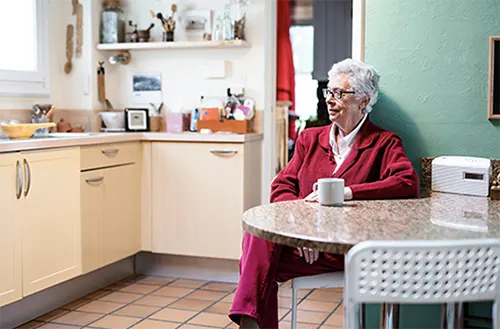Elder Self-Neglect: How to Spot the Signs Within Your Senior Loved One
7 February 2024
Assisted Living & Memory Care in Carrollton GA
Welcome back to our The Birches on Maple assisted living community and our The Birches on Maple memory care community’s blog. Most of you know that we manage this blog on behalf of our cherished residents, their families, and of course for all of you homecare heroes taking care of your assisted living and/or memory care loved ones. Today, we’ll discuss a real concern that many of you might not be familiar with: Elder Self-Neglect.
What is elder self-neglect?
Elder self-neglect is a huge concern for many seniors and their loved ones. Our memory care professionals here in The Birches on Maple have some helpful information regarding this topic, as well as some signs you should be aware of.
According to the National Institute of Health, elder self-neglect is best defined as “refusal or failure to provide oneself with care and protection in areas of food, water, clothing, hygiene, medication, living environments, and safety precautions.” This is typically seen as a person getting older and they struggle to complete the necessary, everyday tasks they need to stay healthy and functional. This can look like poor personal hygiene, missing medications, and doctor’s appointments, skipping meals, and even staying isolated in one place.
This is a growing problem, especially after the global pandemic, and individuals who suffer from underlying health conditions are at even higher risk. For example, if they have Alzheimer’s or dementia, or other chronic conditions, such as diabetes, this elevates the cause for concern. Elder self-neglect only serves to exacerbate mental and physical health issues as well.
According to census data, around 25% of adults aged 65 or older live alone. That comes out to around 14.3 million Americans. Each year, this number only increases as well. According to more data, older adults spend at least half of their waking hours alone, if not more.
Unfortunately, this provides plenty of time for health and well-being to deteriorate, even going unnoticed and flying under the radar. This time spent alone can lead to a downward spiral, especially for those with dementia or other memory loss related issues.
What are the signs?
Whether you are the primary caregiver, or you simply have a senior in your life you love and are concerned about, we have some signs that you should keep an eye out for. Elder self-neglect may not be as easy to spot as you would initially think. Oftentimes, your senior may even try to brush it off or say that everything is fine, even when it’s not.
Here are some of the signs you be aware of and questions you should ask yourself:
- Take a look in their fridge or pantry. Do they have good that is going spoiled or rotting? Does it look like they have been missing trips to the grocery store?
- Check their calendar or date book. Are they missing important appointments, such as doctor visits or dental checkups?
- Do they have frequent, unexplained bruising on their body?
- Are they struggling to get up from a seated position?
- Do they have any difficulties with mobility or walking? Is getting around their home a struggle?
- Do they appear to be uncertain or have confusion when performing basic or routine tasks?
- Are they becoming more and more forgetful?
- Do they have unpleasant body odor? This could mean that they are skipping bathing and not taking care of their personal hygiene.
- Is there a noticeable decline in grooming habits, such as unruly or unkempt hair? What about an overgrown beard or facial hair that looks unclean?
- Take a look around their home. Is the laundry piling up? Do they have a lot of dirty dishes? What about mail and other clutter?
- Keep an eye out for late notices from utility companies, or mail from debt collectors. Check their power and water, is everything still running and functioning?
- What about their diet? Are they eating properly, or have they gained or lost a significant amount of weight recently?
- Are they showing less interest in their hobbies or interests lately? Do they just seem overall resigned or checked out?
- Are they experiencing erratic changes in their mood swings, cycling between one and then the other rapidly?
- Skipping out on medications or failing to take them at all is another huge red flag to be aware of.
While all of these are not exclusively signs of elder self-neglect, and your senior loved one doesn’t have to check every box, they are still a good baseline as to what to be aware of.
If you determine that your senior loved one may be experiencing elder self-neglect, it may be time to reach out for help. As a primary caregiver, it is normal to want to do everything alone and shoulder the responsibility yourself. However, it’s important to know that you don’t have to, and we are here to help. Contact us here at The Birches on Maple Assisted Living and Memory Care in Carrollton, GA!

